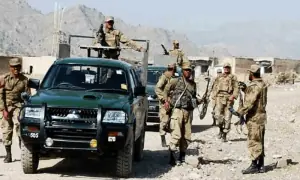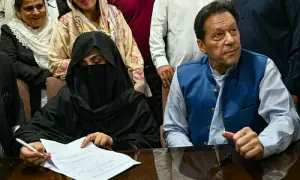New digital ID in Indian Kashmir raises concerns over surveillance
5 min readUniversity student Mehak is used to frequent identification checks by security forces and officials in the Kashmir city of Srinagar, and always carries two forms of ID. Soon, she may need to carry yet another in her purse.
Plans for a new family ID in Jammu and Kashmir have caused confusion and irritation among many residents like Mehak, while rights campaigners fear the programme could lead to increased surveillance and data hacks in the disputed Himalayan region.
“Families already use their ID cards if they need to access any social welfare programmes. So why is this required?” said Mehak, 22, who asked that her last name be withheld.
Regional authorities have said the JK Family ID, an eight-digit code assigned to each household, would improve access to social welfare benefits such as subsidised food grains.
It means families will not have to apply for benefits under various schemes, as eligibility decisions will be automated based on the data, said Prerna Puri, a commissioner in Kashmir’s information technology department.
Across India, the government is undertaking a massive digitisation push, including of health records, property titles, railway bookings and utility payments, as part of the Digital India programme aimed at better governance.
In Indian Kashmir, some see the new family IDs as part of a campaign to exert greater control over residents.
The Indian government led by Prime Minister Narendra Modi withdrew Kashmir’s autonomous status in 2019, and split the former state into two federal territories, aiming to tighten its grip on the Muslim-majority region.
Kashmir residents are right to be wary of the government’s motives, said Angad Singh Khalsa, an independent human rights campaigner, as they have been singled out before for greater surveillance on the grounds of national security.
“Even if the government intends to provide us with benefits by creating these new IDs, their authoritarian treatment towards the people of Jammu and Kashmir has made us doubt their intentions,” he told the Thomson Reuters Foundation.
Trust deficit
Kashmir is claimed in full, but ruled in part by India and Pakistan, who have fought two wars over the territory. A crackdown on an Islamist militant uprising and public protests against Indian rule in the region have killed thousands of people, mostly in the 1990s, when the violence peaked.
Since its special status was revoked, scores more civilians, security personnel and militants have been killed. In anticipation of protests after the move, the authorities imposed a curfew, cut the internet for long periods, and tightened security.
From 2020, the government has required everyone in Jammu and Kashmir to apply for domicile certificates that allow them to vote in local elections, buy farmland and houses, and apply to public universities and for jobs.
Many residents, particularly Muslims, have not signed up for these certificates, uncertain of the ruling Hindu nationalist Bharatiya Janata Party’s motives.
The new family IDs have made people even more wary.
“Creating ‘a unique family ID’ for J&K residents is emblematic of the widening trust deficit after 2019,” Mehbooba Mufti, an opposition leader and former chief minister of Jammu and Kashmir, said in a tweet.
“Kashmiris are viewed with deep suspicion this is another surveillance tactic to tighten the iron grip on their lives.”
Digital exclusion
Issues over India’s national Aadhaar digital IDs have highlighted risks over inclusion and data leaks, say activists.
India introduced Aadhaar in 2009 to streamline welfare payments and reduce wastage in public spending. Since then, it has become mandatory for everything from accessing SIM cards to filing taxes to accessing welfare benefits.
Yet millions of Indians do not have Aadhaar, including large numbers of homeless, transgender and indigenous Adivasi people who may not have a permanent address, or other documents needed for registration.
Security researchers and journalists have also reported multiple vulnerabilities and data leaks tied to the programme, though officials have downplayed the reports and said biometric data was safe from hacking.
Increased data collection for the JK Family ID and the absence of a federal data protection law make residents vulnerable to greater surveillance and exclusion, said Anushka Jain, policy counsel at the Internet Freedom Foundation, a digital rights group in Delhi.
A new draft of a long-delayed data protection law has not yet been passed by parliament. “Any data collection exercise can result in harm. Especially when there are no safeguards, and we have no idea how the data will be used, how it will be stored, and how it will be accessed,” said Jain.
“Even with individual Aadhaar IDs, there is so much exclusion. With family IDs, if there are errors in the data or if one member is caught up in something, then the entire family can be excluded, so the potential for harm is much greater.”
Authorities in Kashmir have said they will collect data with the consent of beneficiaries, and that relevant data protection laws will be applied. Officials have also said they will strengthen the cybersecurity framework.
Kashmir’s family ID is similar to digital IDs introduced in Haryana state in 2020 to allocate welfare benefits.
But in a region that has lagged the rest of the country on investments and economic growth for decades, there are more pressing needs, said Asrar Reeshi, a resident in Srinagar.
“I don’t see how an eight-digit ID will benefit people when there are so many other problems, such as the economic crisis, a lack of hospitals, and an inadequate education system,” said the 21-year-old student.
“They can’t even protect Aadhaar data. Instead of gathering more data to monitor us and violate our privacy, the government should concentrate on giving jobs to unemployed youth.”
For the latest news, follow us on Twitter @Aaj_Urdu. We are also on Facebook, Instagram and YouTube.



























Comments are closed on this story.